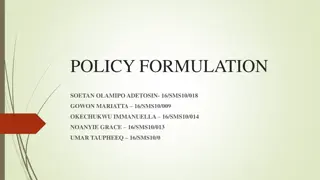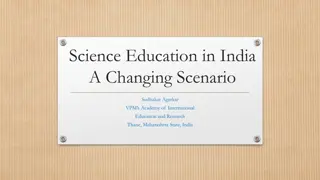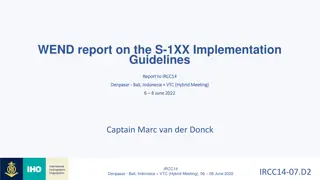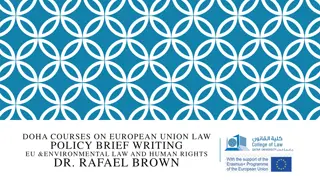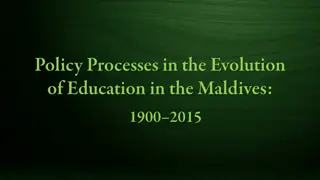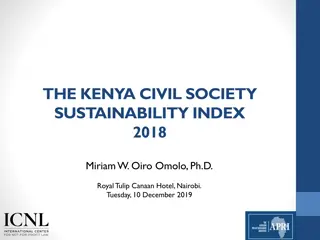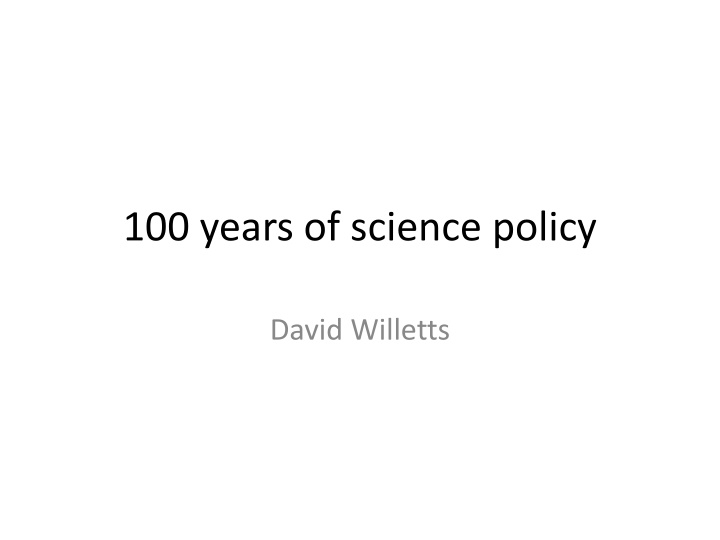
Insights into Science Policy Evolution over Centuries
Explore the evolution of science policy over the last few centuries, from the formation of the Philosophical Transactions of the Royal Society in the 17th century to the impact of World War One on scientific research and education. Learn about key figures like Henry Oldenburg, Humboldt, John Henry Newman, and the challenges faced during the crises of the early 20th century.
Download Presentation

Please find below an Image/Link to download the presentation.
The content on the website is provided AS IS for your information and personal use only. It may not be sold, licensed, or shared on other websites without obtaining consent from the author. If you encounter any issues during the download, it is possible that the publisher has removed the file from their server.
You are allowed to download the files provided on this website for personal or commercial use, subject to the condition that they are used lawfully. All files are the property of their respective owners.
The content on the website is provided AS IS for your information and personal use only. It may not be sold, licensed, or shared on other websites without obtaining consent from the author.
E N D
Presentation Transcript
100 years of science policy David Willetts
The Previous 250 years Henry Oldenburg, the first Secretary of the Royal Society, created the Philosophical Transactions of the Royal Society in 1665 and asked three of the Society s Fellows with specific expertise to comment on submissions before deciding whether to publish them. See Science as an Open Enterprise, The Royal Society, June 2012
HUMBOLDT one could surely entrust the expansion of the sciences to the universities alone, provided the latter are properly set up, and for that purpose dispense with the academies
NEWMAN The view taken of a University in these Discourses is it is a place of teaching universal knowledge the diffusion and extension of knowledge rather than the advancement. If its object were scientific and philosophical discovery, I do not see why a University should have students.
World War One many of our industries have since the outbreak of war suffered through our inability to produce at home certain articles and materials required in trade processes, the manufacture of which has become localised abroad, and particularly in Germany, because science there has been more thoroughly and effectively applied to the solution of scientific problems bearing on trade and industry A great part of all research will necessarily be done in Universities and Colleges which are already aided by the State Scheme for the organisation and development of scientific and industrial research Cd 8005, July 1915. Paragraphs 1 and 5
THE CRISIS OF 1916 The enormous educational machine in America, which is so much more important than anything of the same kind we have in Europe, is almost entirely run from Germany. A very large proportion of the staffs of the colleges and universities has received all its educational training, or at any rate its postgraduate training in Germany. (Observer 18 June 1916)
BALFOUR There appeared to be, rightly or wrongly, an impression that there exists among British Universities, as compared with German or French, a degree of local independence and variety, combined with a lack of any common organisation or even meeting ground for consultation, which made it very difficult for Americans who might desire to finish their studies abroad to find out what work was being done in Great Britain and what University could best provide for their needs. I am venturing now to invite representatives of all the Universities of Great Britain and Ireland to meet Mr Fisher and myself at the Foreign Office and confer upon the whole subject.
The Haldane Structure 1916 DSIR 1917 Dphil 1918 CVCP 1918 Haldane 1919 UGC
Trend Report 1963 the various agencies concerned with the promotion of civil science do not, in the aggregate, constitute a coherent and articulated pattern of organisation; second that the arrangements for co-ordinating the Government s scientific effort and for apportioning the available resources between the agencies on a rational basis are insufficiently clear and precise.
The modern research council model Wilson s White Heat of the Technological Revolution Hailsham invents the Haldane Principle Waldegrave Sainsbury and full economic cost funding
Designing the Framework Science budget v departmental R&D University v Research Council funding Universities v Research Institutes
Rothschild 1971 However distinguished, intelligent and practical scientists may be, they cannot be so well qualified to decide what the needs of the nation are, and their priorities, as those responsible for ensuring that those needs are met. This is why applied R & D must have a customer R&D with a practical application as its objective, must be done on a customer-contractor basis ..Basic, fundamental or pure research, called basic research in this report, has no analogous customer- contractor basis One of the main tasks of the Council or Scientific Policy, also under the DES, is to advise the Secretary of State for Education and Science about the distribution of funds between the five Research Councils.
Government response to Rothschild 25% cut from Research Councils for Departments It does not intend to interpose any executive statutory body between the SoS for Education and Science and the Research Councils.
UKRI Created 2017 implementing Nurse Report Individual research councils brought into one structure and lose royal charters To boost funding for inter-disciplinary research But has added an extra layer of decision- taking.
The Dual funding model HEFCE high trust, endowment ( 1.6b) Research Councils low trust, contractual ( 2.7b)
A taxonomy of our PSREs Conserving data - BGS Measurement and standards - NPL Doing Research - LMB
Problems Sustaining PSREs Public sector rules Departmental insouciance Privatisation Competitive bidding v core capacity The Manchester Guidelines and the Vallance review
The German Alternative Max Planck Leibniz Helmholz Fraunhofer
HE R&D % of Gross R&D COUNTRY HERD%GERD China (People's Republic of) 6.9 Korea 9.1 Japan 12.6 United States 14.2 Germany 17.3 France 20.6 Finland 22.9 United Kingdom 26.1 Sweden 29.0 Norway 31.1 Denmark 33.2
The Innovation Challenge PSREs v university The competition for research excellence Criteria for winning funding The spin-out fallacy
The British Model High on autonomy Low on application Good for the rankings Bad for Innovation
















